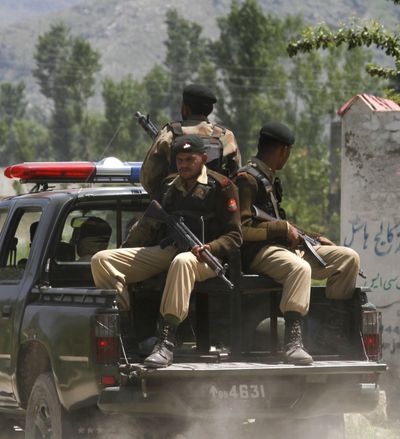Attention turns to Pakistan’s role
Skeptics wonder how bin Laden hid there for years

WASHINGTON – The U.S. military’s successful takeout of Osama bin Laden raised big questions – and a chorus of skepticism – about whether Pakistan’s military and intelligence services knew all along that the global terrorist leader was hiding in their backyard.
The raid also put U.S. military boots and helicopters on the ground inside Pakistan’s sovereign territory, an unwelcome encroachment even though President Barack Obama had reserved the right to do it if he obtained “actionable intelligence” in the hunt for the al-Qaida leader.
There was little question that the raid on bin Laden’s hideout marked a new shift in the dynamics of the frayed, seesawing U.S.-Pakistan relationship, one that’s vital to both sides, but for quite different security reasons.
Economically struggling, Pakistan and its military have received billions of dollars in American aid in the nearly 10 years since the Sept. 11 terror attacks, while the U.S. needs counterterrorism help from the country that is one of the world’s biggest terrorist havens.
Culminating a 15-year hunt, bin Laden was found in a neighborhood filled with retired military officers, near several key military installations and that is undoubtedly watched over by Pakistan’s most powerful intelligence service.
Skepticism toward Pakistan’s failure to arrest him months or even years ago stems in part from its history of allowing Taliban and al-Qaida members to flee across the border when U.S. troops invaded Afghanistan in the fall of 2001. In addition, a Pakistani nuclear expert shared secrets of atomic bomb making with rogue countries, and Pakistan has a history of using extremists to wage a proxy war against rival India.
U.S. officials have even accused the Pakistani intelligence service of supporting Afghan Taliban in their zeal to ensure that the next Afghan government will favor their country over India.
Just three and a half months after a CIA contractor fed seething anti-American resentment among Pakistanis by fatally shooting two people, whom he claimed tried to rob him, some experts said that the U.S. strike would now prove a big embarrassment to Pakistan.
“By virtue of having done this, we have sent a message that we are either going to do this with or without you,” John McLaughlin, the former acting CIA director, said in a phone interview. “It gives them a pretty clear choice. It offers a position for leverage with Pakistan, provided we don’t rub their face in it.”
McLaughlin ticked off several areas of concern where Pakistan might now be persuaded to be more helpful, among them contending with the presence of members of the Afghan Taliban and their allies inside its borders.
“I would think they would not want us to take the same approach to that as we took to bin Laden,” McLaughlin said.
Finding bin Laden near military and intelligence installations “doesn’t look very good for Pakistan,” especially its primary intelligence service, the Inter-Services Intelligence Directorate, said Wendy Chamberlain, who was the U.S. ambassador to Pakistan when al-Qaida hijackers attacked the United States on Sept. 11, 2001.
“Either the ISI knew he was there, and they were covering for him, which makes them part of the duplicity … or they didn’t know, and that makes them incompetent,” she said.
As recently as October, Rehman Malik, Pakistan’s interior minister, said: “I categorically deny the presence of Osama bin Laden, his deputy Ayman al-Zawahri and even Mullah Omar in any part of Pakistan.”
Sen. Susan Collins of Maine, the ranking Republican on the Homeland Security Committee, told a news conference that she finds it hard to believe that bin Laden could be living near military installations, including the Pakistani version of West Point, without arousing “tremendous suspicion.”
Asserting that Pakistan is “at times playing a double game,” she said that Congress needs to “keep the pressure on Pakistan, and one way to do that is to put more strings attached to the tremendous amount of military aid that we give the country.”
Independent Sen. Joseph Lieberman of Connecticut, the panel’s chairman, said he expects Congress to press Pakistani officials “to prove to us that they didn’t know that bin Laden was there.”
Chamberlain stressed, however, that the Pakistani military cooperated with the United States in sweeping up al-Qaida leaders from “safe house after safe house” in their country after the Sept. 11 attacks.
Publicly, U.S. officials said Monday that Pakistan had provided information that helped bring bin Laden down. But privately, they said the information provided by Pakistani intelligence sometime ago represented just a small tile in a huge mosaic assembled by the CIA, not a critical piece. Nor did the Pakistanis understand the value of the information.
“Through the process, there were lots of difference puzzle pieces,” said a U.S. official, who asked not to be identified because the matter is sensitive. “The Pakistanis did not know that the information had anything to do directly with bin Laden.”